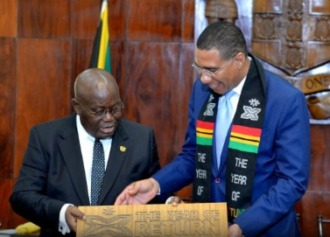Jamaica has announced plans for its second debt swap in three years in the face of a “serious economic crisis”.
Prime Minister Portia Simpson Miller is taking measures to reduce its debt, which currently stands at 140% of gross domestic product (GDP), one of the highest ratios in the world.
“If this debt is not reduced, Jamaica faces a dismal future,” she said.
The move is aimed at satisfying conditions demanded in a deal with the International Monetary Fund.
About 55% of government spending goes towards paying the nation’s debt, while 25% goes on wages. That leaves just 20% for everything else – including education, security and health.
‘Significant sacrifices’
In a televised address, Ms Simpson Miller, who belongs to the People’s National Party (PNP), said a national debt exchange would be launched.
The administration will offer a swap of higher-interest debt for lower-cost debt and will require “significant sacrifices” from financial institutions and domestic bond holders.
The move follows an earlier debt restructuring in 2010 under the previous Jamaica Labour Party (JLP) government.
Since many bondholders already took a hit in 2010, Finance Minister Peter Phillips acknowledged that they were likely to be disappointed, but urged them to accept the offer.
He said it should reduce the country’s debt-to-GDP ratio by 8.5% a year until 2020.
Tourism downturn
Jamaica has been negotiating a loan with the IMF for the past year. As part of the agreement, the country must reduce debt, as well as the government wage bill.
This implies “significant austerity in the public sector” according to Laurence Allan, Latin American and Caribbean analyst at IHS Global Insight.
He says that “Simpson Miller faces a massive challenge” in getting the reforms through and that many “poor and ordinary Jamaicans view Jamaican elites as those who caused the debt problem and, conversely, who have suffered the least from its consequences”.
But he adds that “no Jamaican government in recent memory has enjoyed such favorable domestic political conditions”.
Jamaica is one of a number of Caribbean countries struggling with a growing debt burden amid falling tourism revenues.
Read more: BBC


